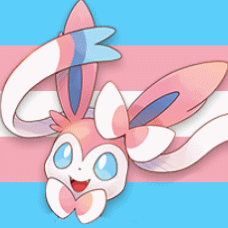alt-text: [yellow text saying “different pronouns in different spaces” next to the queer anarchist flag and on a 2d digital art wooden background]
Interesting idea, but I don’t think that’d work for me. I only have one set of pronouns (she/her), anything else feels like a misgender to me.
Question: I tend to use they/them both when I’m unsure of someone’s gender or pronouns, and when gender is irrelevant to a given conversation. Does that also feel like a misgender?
(Disclaimer: I might be biased, because I feel more like agender, which means I’m more comfortable not referencing gender at all)
For me, anyway, they/them is in its own category, where they aren’t my pronouns, but I have no issue with someone using them for me. I wouldn’t get upset unless someone is blatantly trying to use it to misgender me for whatever reason. In your situation, if it makes you feel more comfy to use gender neutral pronouns for me, I’m fine with it.
Are you going to say why, or is this just a plot to drive traffic to a video?
mb, I forgot to say video on it in the title, it is answered there
Hmmm, I honestly thought this was going to explore the topic of people that are in the closet about their gender identity. Or maybe, plural people. I find this video more confusing than anything.
I think the way you describe it is perhaps too abstract for me to understand the points you’re making.
I find this passage rather distressing however “Pronouns reference the framework you expect someone to use to process your words”. I find that language scary sounding. It feels like specifying someone’s pronouns is forcing an ideology or status on someone and I just don’t think that’s true at all.
I also don’t think saying gender has “dedicated pronouns” is really accurate. Neopronouns exist and they still confer meaning to the person so I don’t think it’s a defined set. Different languages also have different pronoun systems which complicate creating a specific set.
I find the third argument kind of odd. I think that displaying pronouns in general has the same effect you’re describing without the need for different pronouns in different spaces. The same thing is true for things like a role bot or other tools to allow people to display their pronouns.
I mean pronouns dedicated to gender, so gender has pronouns dedicated to it, not that it is some universal list. Also, you aren’t “forcing an ideology” on someone, if you describe something in terms of an ideology people must use an understanding of that ideology to process your words, for example. If I write something in binary you have to use a binary decoder to read it, you will get nothing useful if you use something else, so forcing you to decode binary is forcing you to use binary. There is nothing scary about that.
people who are parts of a system can do pronouns either way, so this isn’t much more relevant to them in the first place. Trans people in the closet are included in this.
Some of the same people will see you in different spaces, so it will have a different impact.
I’m not sure of I understand it correctly. Would pronouns in this case carry the same value as titles do, or terms of endearment? Maybe a mix of both. Titles have the explicit aspect, but terms of endearment inform the kind of relation we have in an informal situation.
The practical use still escapes my imagination. Would you talk more about that?
pronouns do have some overlap with those, yeah
practical use for a lot of things comes after building the systems where it is available in the first place. I have seen it used to designate what kind of furry someone is, I am not in those communities much so I don’t know the specifics but I imagine that can save time and confusion. One set of pronouns for those furry spaces, one for outside.
I use it/its in spaces where I do not plan on engaging with people as individuals, like on youtube where I get hundreds of comments and I’m not going to bother reading usernames. Designating the kind of interaction I will carry out and what to expect there is a good use case.
It is hard to find more examples as it is such a personal thing and not many people do it yet
I use it/its in spaces where I do not plan on engaging with people as individuals
I see your pronouns on Beehaw are it/its, can you clarify whether you intend on engaging with people as individuals and if not how that shapes how you treat them?
I do not read usernames and take messages as they are without looking for additional context. This space is not a chat room and there is no reason to treat it as such. It is a forum.
Beehaw may not be the right space for you if you’re unable to consider context. Beehaw is explicitly a community, a safe space, and somewhere where context absolutely matters. We don’t believe it’s possible to have a healthy community where people don’t see each other as complex humans. We talk about this, quite a bit in our docs, for example in the the doc titled Beehaw is a community we talk about how community is a necessary part of this platform and in the doc titled Beehaw, Lemmy, and A Vision of the Fediverse we talk about how we want to be more like a village than we do a train station (and link to a fantastic article about this) and that’s a direct reflection of the importance of social ties and connections to running a healthy community.
I’m certainly not saying that you should leave, but I am typing all of this up because I need you to understand what our values are around here. Some of your content and your interactions have already been reported by multiple people - I mention this because I think it’s a reflection of your attitude towards your purpose here and how you are interacting with the space. I’ve advised others to hold on taking moderator actions because I know adapting to and interfacing with a community and that this process can often be bumpy- we wish to give people good faith when it is deserved, but that is predicated on a willingness to engage in good faith with the community. If that is not how you wish to interact with social media, that is your decision and we will respect it, but this is not a place where we allow that kind of behavior.
I never said anything about not seeing people as complex humans? I’m confused
It’s hard to engage with such short replies. What parts confuse you? What do you need more guidance on? Is there anything else that is unclear about my response and how we value community around here?
deeper context involves like, reading the last 10 posts someone made to get an idea of who they are before responding, is that expected here? I am not understanding what you want from me
Makes video about the importance of pronouns. Refuses to read names or pronouns of the people that interact on the platform where they posted said video.
Hmmm…
I never said anything about pronouns
The first word you submitted in this comment chain is literally “pronouns” and the topic of conversation is your stated choice of “it/its” pronouns and implication that you use them when not engaging with individuals, like on this board.
I think they meant that they didn’t say anything about not reading pronouns, just usernames.
I think this person is just very very very bad at communicating details.
That seems counter productive on Beehaw since a whole lot of folks around here put their pronouns in their usernames
I use it/its in spaces where I do not plan on engaging with people as individuals, like on youtube where I get hundreds of comments and I’m not going to bother reading usernames
Like @Vodulas I’m a little perplexed by this and hope you won’t mind providing some more clarity
I use it/its in spaces where I do not plan on engaging with people as individuals, like on youtube where I get hundreds of comments and I’m not going to bother reading usernames.
I’m a little confused with this part. Are you referring to commenters using it/its or use it/its for yourself, but only on YouTube? I am a little put off by the second part, but I think I might be missing what you mean. Are you saying your replies on YouTube comments are going to be low effort interactions or that you aren’t considering the individuality of YouTube commentors at all? If the latter, that might lead to some pretty terrible interactions there. Not that YouTube comments are known for being good interactions, but I have seen channels be able to cultivate pretty positive comment sections. Being dismissive of folks might perpetuate bad behaviors and cultivate some pretty terrible attitudes.
I can see the benefit of setting expectations for interaction, but as someone that only uses one set of pronouns, I don’t think different ones in different spaces would work for me. Some other signifier might though.
I feel like I get what you’re saying, and I think that drag queens are probably a better example, where they may use a different set of pronouns while in drag than out.
So if I’m I’m understanding the idea correctly, it would be something like (for me)
- I use he/him for my friend group, who I expect to have a personal relationship with me
- I use they/them (singular) in the workplace, where I am a peer but not really a personal acquaintance
- I use they/it online, where who or what I am is unimportant to anyone but me (it’s my choice whether to divulge info about myself)
I see the logic there, and I think it almost feels like treating all pronouns as neopronouns, where each pronoun set embodies a different aspect of your Self: my work self’s pronouns, my home self’s pronouns, etc etc.
I think the biggest pushback you’ll see from this is that most people aren’t comfortable with using varying pronoun sets, and definitely not for ‘traditional’ pronouns.
Why “they/it” instead of also “they/them”?
I was under the impression that “they/them” were the already established pronouns when gender is irrelevant.
I was just using that as an example, since I already listed they/them as the second pronoun set
I get that, I’m just trying to understand the difference between /them and /it in that example. I feel like “them” is more generic than “it”, so I feel like “them” would be a better fit in a space where it’s nobody’s business, the same as in a professional setting.
Am I mistaken or missing something?
I feel like “them” is more generic than “it”
That’s interesting. I hadn’t really thought of them in terms of comfort level needed to use them with others, and after considering it I think you’re probably right.






